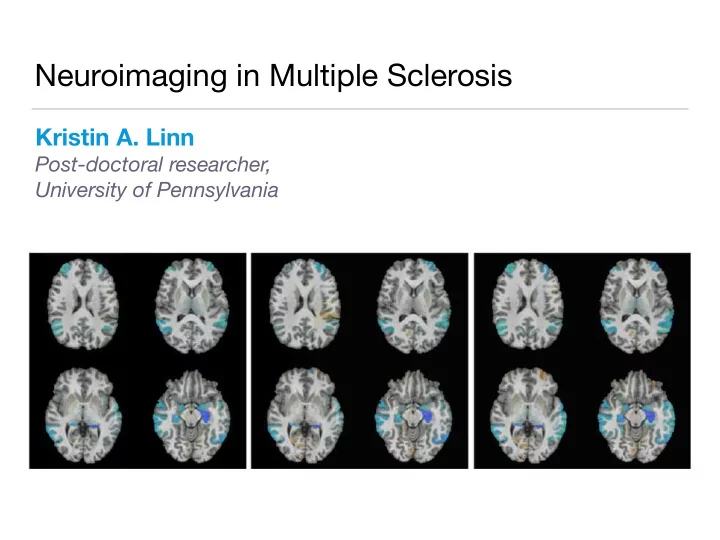

Neuroimaging in Multiple Sclerosis Kristin A. Linn Post-doctoral researcher, University of Pennsylvania
Personal Background 2004 - 2008 2009 - 2014 2014 - 2017 Recurse Center
Structural MRI 3D array of voxels • 2D Grayscale intensities provide • pixel contrast between different tissue types Standard size approximately • 256 x 256 x 176 voxels 3D voxel Axial slice of a T1 image
Structural MRI in Multiple Sclerosis Used to study lesion accumulation in brain and spinal cord • MS lesion dynamics Inflammation
Structural MRI in Multiple Sclerosis Used to study lesion accumulation in brain and spinal cord • MS lesion dynamics Inflammation Tissue damage and demylenation
Structural MRI in Multiple Sclerosis Used to study lesion accumulation in brain and spinal cord • MS lesion dynamics Inflammation Tissue damage and demylenation Tissue repair and remylenation
Structural MRI in Multiple Sclerosis Used to study lesion accumulation in brain and spinal cord • MS lesion dynamics Inflammation Tissue damage and demylenation Tissue repair and remylenation
Quantifying MS Treatment E ffi cacy • Do chronic lesions show evidence of repair in response to treatment? Pre-treatment Post-treatment
Quantifying MS Treatment E ffi cacy • Do chronic lesions show evidence of repair in response to treatment? Pre-treatment Post-treatment • Initial comparison of average chronic lesion intensity before and after treatment was highly significant
Quantifying MS Treatment E ffi cacy • Do chronic lesions show evidence of repair in response to treatment? Pre-treatment Post-treatment • Statistical challenges : confounding, automatic lesion segmentation, image preprocessing
Preprocessing README 12 steps before analysis • Current analysis is a t-test ! • Each induces errors/uncertainty • that is not easy to account for Typically, researchers ignore • preprocessing uncertainty
Registration Error Image alignment sometimes off by one slice • Pre- treatment: Post- treatment:
Registration Error Pre- treatment: Leads to bias in favor of a treatment effect! Post- treatment:
Registration Error Pre- treatment: Post- treatment:
Registration Error Pre- treatment: Post- treatment:
Moving Forward Many opportunities for statisticians to contribute in meaningful ways • to neuroimaging research Need more sophisticated methods to account for preprocessing errors •
Moving Forward Many opportunities for statisticians to contribute in meaningful ways • to neuroimaging research Need more sophisticated methods to account for preprocessing errors • Steep learning curve (anatomy, physics, engineering) •
Moving Forward Many opportunities for statisticians to contribute in meaningful ways • to neuroimaging research Need more sophisticated methods to account for preprocessing errors • Steep learning curve (anatomy, physics, engineering) • Any methods/models we build must be fast with high-quality, well- • tested software
Acknowledgements Imaging and clinical collaborators: Post-doctoral Advisor: Salim Chahin, M.D. (Penn) Gabrial Pilar, M.D. (Penn) Clyde Markowitz, M.D. (Penn) Matthew Schindler, M.D. (NIH) Emily Acton (Penn) Taki Shinohara, Ph.D.
Happy 75 th Anniversary!
Recommend
More recommend